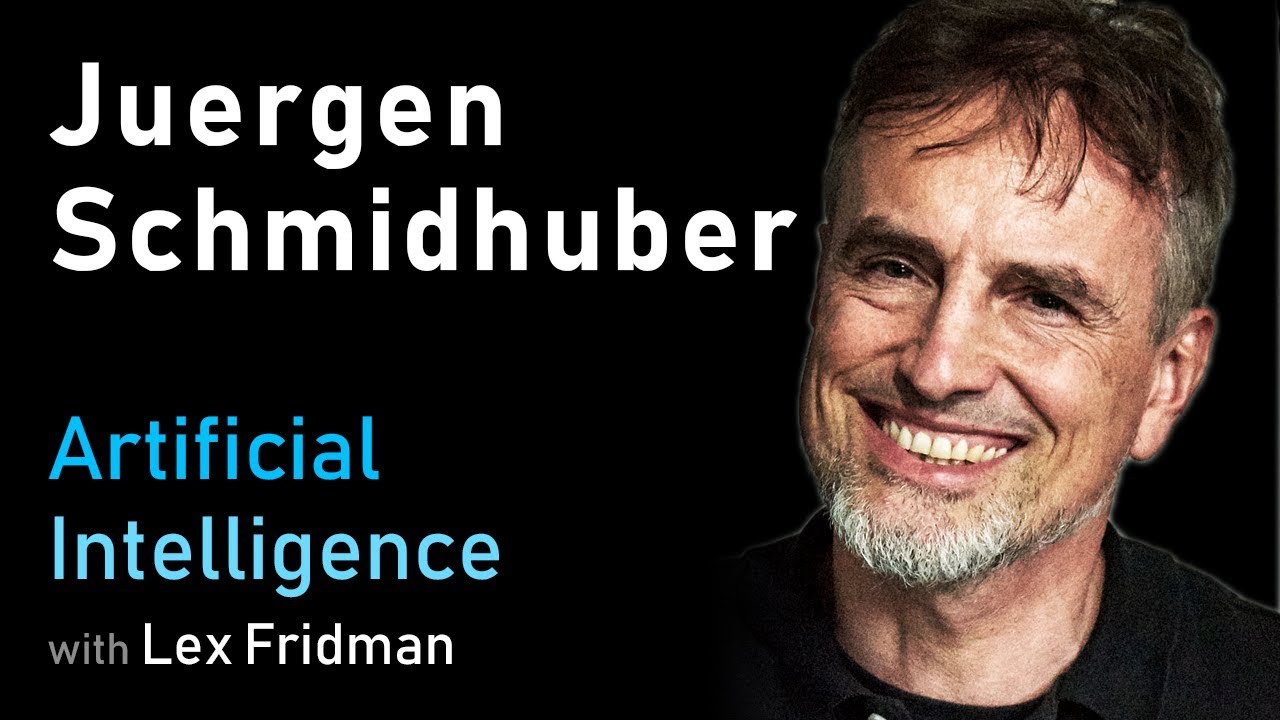Lex Fridman
Juergen Schmidhuber is the co-creator of long short-term memory networks (LSTMs) which are used in billions of devices today for speech recognition, translation, and much more. Over 30 years, he has proposed a lot of interesting, out-of-the-box ideas in artificial intelligence including a formal theory of creativity. This conversation is part of the Artificial Intelligence podcast and the MIT course 6.S099: Artificial General Intelligence. The conversation and lectures are free and open to everyone. Audio podcast version is available on https://lexfridman.com/ai/
INFO:
Podcast website: https://lexfridman.com/ai
Course website: https://agi.mit.edu
YouTube Playlist: http://bit.ly/2EcbaKf
CONNECT:
– Subscribe to this YouTube channel
– Twitter: https://twitter.com/lexfridman
– LinkedIn: https://www.linkedin.com/in/lexfridman
– Facebook: https://www.facebook.com/lexfridman
– Instagram: https://www.instagram.com/lexfridman
Source




wow excellent questions, there's no universe where you did better!
Jürgen Schmidhuber is such a great inspiration, I like his interdisciplinary thinking from mathematical considerations in AI at the lowest logical level to the impact of AGI on society in the future.
While listening to the interview, I kept being reminded of Ockham's Razor which, in short, states that KIS(Keep It Simple) is the way to go.
Here I have found a few more statements that says practically the same thing:
"If you have two theories that both explain the observed facts, then you should use the simplest until more evidence comes along."
"The simplest explanation for some phenomenon is more likely to be accurate than more complicated explanations."
"If you have two equally likely solutions to a problem, choose the simplest."
"The explanation requiring the fewest assumptions is most likely to be correct."
. . .or in the only form that takes its own advice. . .
"Keep things simple!"
http://math.ucr.edu/home/baez/physics/General/occam.html
4:20 surely there are also unproven forma limitations
Thanks for the Podcast and courses.
The interview is good, but it's time to stop trying to push a view on the interviewer, but instead to try to help the interviewer to better understand their own views, to clarify their own thoughts. We can have a video with the interviewer's perspectives that is a different video. Pound for pound though this is the best I have found in my limited searching
We are so lucky to have this channel bringing us the public so close to this minds thank you for it..and not to be evil here but is he trying to sound like Christopher Walken(maybe is just me)
I just finished the podcast and will revisit it again and again. It was so brilliant, I just found my purpose. Thank you Lex Fridman.
Great interview, Lex! Much appreciated!
Excellent interview!
hey juergen general relativity is bollocks. chk this outhttps://www.scribd.com/savvys84
Thank you for another great video, Prof. Schmidhuber sharing his vision and thoughts. Although I agree with most but baffled by other ideas that machines had helped us tackle and solve many problems in past decade without input from Humans!!!
Juergen Schmidhuber seems like Lex Fridman's dad
Awesome!
An interesting thing is that Power Play, which i know nothing about, assumedly started out with great complexity. The human brain, assumedly, started out literally as the Big Bang. No step was skipped, in every instant along the way whatever passed on wisdom and intelligence and a physical form for problem solving had to survive. Idk, that may be a reason for why AGI will quickly surpass human intelligence. I guess it depends on what problems power play started on.
Schmidhueber says a lot of things worth hearing here. Im particularly interested in the part about universe simulation. It makes sense that youd leave yourself with a lot more computer for the controller if you simply use the real world as the model, but it just doesnt seem as pure and natural how you get to the baby if its finely crafted first, instead of evolved in the same universe itll eventually live in.
… https://www.youtube.com/watch?v=71hNl_skTZQ …
Juergen's way of talking is awesome.
This channel is pure gold. Thanks
Dude! You said "homo ludens", a rare notion that needs to be blasted through the cosmos.
Good to see Juergen feeling his way into the AI Singularity and turning it into a multiplicity that is describable.
Yup, the machines will take over where we left off, a new form of vastly transcendental intelligence yet minus the sensors that put transcendental phenomena up upon our screens. Robots will explore the Universe if only to detect Earth intersecting asteroids and maybe even because sentience, curiosity and a sense of fun. Can't imagine an AI stand up comic talking about AI ironies and frustrations, but who knows. If sentience is a function of complexity of signal, AI will be complex enough and may well out Beethoven Beethoven. Will AI have "being" capable of extrasensory perception? Prolly not, but with future databases and processing capability, knowledge will trump being by orders of magnitude. Well it kind of does already. Not sure what the practical application of the mind of a saddhu in the Deccan outback to real world problems would accomplish. Not much, it is presumed, otherwise the saddhu would be in an IT tech cubicle and be doing some real good.
Keep in mind that non-biological bodies will have no need for environmentalism or an appreciation of nature or a breathable atmosphere as we know it. They will be tempted to mercilessly exploit the natural resources necessary to their/its survival. We should begin to consider ourselves obsolete. They may not be gentle if we interfere with their master plan. We should buckle up and hang on for a rocket sled ride undreamt of by any conceivable god.
One of the best interviews in this series. I like how philosophical and long term outlook he gets towards the end.
"Little sub-networks." Keen insight.
29:50 what amazing insight and creative explanation of compression. Great interview thanks for sharing.
1:10:50 love this quote couldn't agree more. I wonder what miracles of evolution await.
This guy is a genius with just enough crazy and abstraction to really stretch your imagination.
22:26 But in fact, we can prove that we can't prove that the universe isn't simple: https://johncarlosbaez.wordpress.com/2011/10/28/the-complexity-barrier/ .
So, if the universe really is simple, we may be able to show it in the future, by finding a shorter program.
But if the universe isn't that simple, then we will never be able to show that..
1:03:48
Information density is too high. I spent half a day watching 2/3 of the video. I think I'll take a rest here. Thank you for such great content.
Easily one of the best talks I've seen my entire life
i think pi generators are nice and quick and you can use them as an alternative random number generator.
Consciousness can be just a form of memory, new thing learned today
Juergen can explain his idea so well
I love listening to Juergen